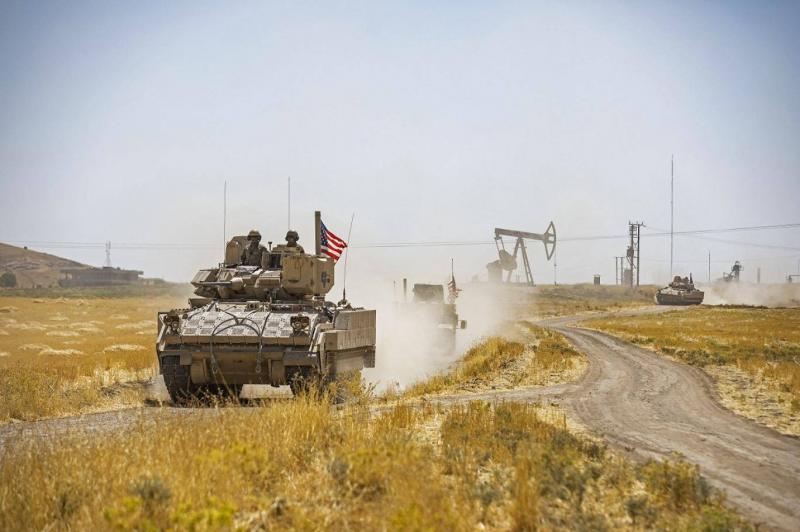The announcement by Iraqi Prime Minister Mohammed Shia' al-Sudani on Thursday that the Iraqi government is "proceeding" towards ending the presence of the international coalition in Iraq falls within a political framework, according to experts and observers. It reveals a situation that prevents taking a security or military stance regarding the escalating attacks and responses between the United States and Iran-backed militias, as well as others linked to an "Iran-friendly agenda." The Pentagon's airstrikes on three positions belonging to the Iraqi Hezbollah brigades were carried out in response to a drone attack by the militia on Erbil airbase, resulting in injuries to three American soldiers.
Al-Sudani stated that "the government is in the process of restructuring its relationship in light of capable Iraqi forces," affirming that it is "proceeding towards ending the presence of the coalition forces, which include security advisors supporting the security forces in training, advising, and intelligence cooperation." He mentioned "recent attacks on Iraqi military bases and diplomatic missions," with the official government stance considering them "hostile acts that harm national interests and affect the security and stability of the country." He also emphasized "the importance of adhering to the legal mandate granted by previous Iraqi governments for this presence, which should be within the framework of support for security forces in training and should not exceed the limit of military operations as they represent an infringement on Iraqi sovereignty, which is unacceptable."
### Why Now?
What al-Sudani stated is not new regarding the presence of coalition forces in Iraq, as he had previously referred in September to the "defeat of ISIS," which elicited a response from the United States. Three months ago, Washington confirmed that the presence of American forces in Iraq "is an agreement with Baghdad," following al-Sudani's remarks that ISIS "is no longer a threat," and that his country no longer needs the international coalition. U.S. State Department spokesperson Matthew Miller stated at the time, "In August, we issued a joint statement with our Iraqi partners reaffirming that we are present there at their request, and we intend to consult on a future process that involves the coalition to determine how the coalition's military mission will evolve." He added, "Iraqi security forces lead the missions against ISIS in Iraq and have shown an increased capability to confront this threat."
Iraqi political researcher Haitham al-Hiti believes that al-Sudani's statements regarding the move to end the international coalition's presence in Iraq are "realistic and represent the most honest political statement from a responsible official since 2003." He explained that "the political agenda of the ruling elite is aligned with Iran, not the United States," which is reflected in the current reality. Loyalty to Iran has several directions, primarily "making Iraq a permanent economic outlet for Iran or a breathing space such that it would be dominated." Al-Hiti adds that "Iran is part of the Russian-Chinese global route that competes with U.S. hegemony, so it tries to detach Iraq from the latter."
Researcher Mujahid al-Sumayji at the European Centre for Counterterrorism Studies believes that "the Iraqi government is in a difficult position in terms of its ability to stop the bombardments coming from militias and the responses from the United States." He claims that al-Sudani's statements are "political" and reflect "the incapacity of his government to take a strong security or military stance to stop these interventions," referring to the ongoing bombardments and reciprocal responses.
### Is Iraq Capable of Abandoning?
After the rise of ISIS in 2014 and its control over nearly one-third of Iraqi territory, Washington formed an international coalition to support Iraqi and Kurdish forces in Syria. Despite its defeat in 2017 in Iraq, the organization still claims periodic attacks in the country, and the coalition remains active in Iraq to prevent its resurgence, even though it announced in 2021 that "combat missions have ended." The international coalition currently includes approximately 2,500 American soldiers and around 1,000 from member countries, stationed at military bases under the command of Iraqi forces.
Al-Sumayji believes that the Iraqi government "needs a plan if it wants to expel the coalition led by U.S. forces, which could take five years or three or less." He notes that the coalition has been conducting "logistical operations, training, and bombings against ISIS positions based on information coming from Iraq or intelligence agencies." He adds, "If Iraq wants to end this presence, it must prepare to fill the void by deploying capable forces for logistical support and counterterrorism and bombing sites." He stresses that it should be able to gather intelligence and reconnaissance efforts in the battle against the organization; otherwise, "the outcome will be tragic as happened in 2011 when U.S. forces left, and terrorism spread until the country collapsed in 2013."
### What About Support?
Iraqi forces rely heavily on Iranian support and Iran-backed militias and the coalition, according to Rich Outzen, a senior fellow at the Atlantic Council and a former U.S. officer. He observes that "the government's demand for the coalition to depart would deepen reliance on Iran and its proxies." "Iraq may be able to contain the remnants of ISIS on this basis, but not to the same extent, and not without ceding more control to Tehran," he adds. The American expert also points out that the Iraqi government heavily relies on financial and banking support from Western companies. He continues, "If the coalition forces are invited to leave, it is unclear whether other forms of support will be maintained at the same levels."
Researcher al-Hiti highlights a similar notion, stating that "the American side controls Iraqi financing, meaning the amounts coming from American banks for oil prices." This aspect forms "the sole obstacle preventing Iraq from exiting the path imposed by the United States." Nonetheless, the researcher believes that "in the long term, and not very far away, there may be potential Iraqi solutions with China, Russia, and Iran to extract Iraq from its current trajectory." Baghdad may seek to end the coalition's ground presence while maintaining external support (air support, logistical services, etc.) centered in neighboring countries, according to former U.S. officer Outzen. He asserts that "it is unclear whether the United States would agree or should agree to this," suggesting that al-Sudani's statement could be "a means for Baghdad to pressure Erbil, where the Kurdistan Regional Government benefits more than anything else from the coalition's presence."




